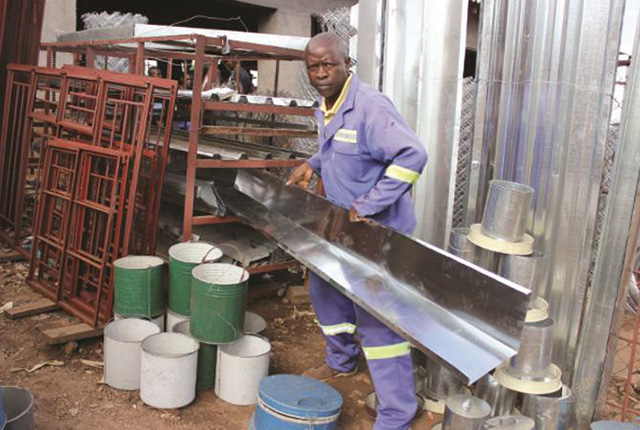Leaving no stone unturned to tackle HIV/Aids pandemic

Paidamoyo Chipunza recently in Durban, South Africa : Senior Health Reporter
“While a lot has been achieved in terms of reducing the number of new infections and putting HIV-positive people on treatment, we are faced with new challenges, which if nothing is done, could erode all these gains. “A united front of people living with HIV and Aids is therefore needed now more than ever to effectively tackle all these challenges.” These are the words of the Zimbabwe HIV and Aids Activists Union (ZHAAU) president Stanley Takaona.In an interview after the just ended 21st International Aids Conference, which took place in Durban, South Africa last week, Mr Takaona said one of the key areas of concern, which was deliberated on during the largest HIV conference, was the reduction in donor funding.
“We are not going to accept that particularly from the Global Fund, because it is countries that put monies there. We as people living with HIV say no to these cuts because it is tantamount to putting those on treatment on death sentence,” said Mr Takaona.
He said reduction in funding was likely to result in drug stock-outs, which would in turn force people to miss medication leading resistance to HIV treatment, hence the rebound of the epidemic.
Mr Takaona said while they advocated for more resources towards HIV, countries must also increase domestic funding and make use of the available resources effectively.
“We are going to re-visit the Abuja target. We know that in the process, some of the resources would go towards HIV and Aids. This is one of the reasons why we need a united front, so that we speak with one voice,” said Mr Takaona.
Back home, Mr Takaona said they were also going to advocate for fulfilment of the Abuja target, which recommends at least 15 percent of a country’s national budget be channelled towards health.
However, since adoption of the declaration Zimbabwe has never surpassed the Abuja target with the highest allocation so far being 12,3 percent allocated in 2011. Other allocations range between six and nine percent of the national budget.
Mr Takaona said while involvement of people living with HIV and Aids was improving, there was also need to re-look at the involvement of youths and adolescents.
“While our young people go and make presentations at these high level meetings, we do not know how they get down to the communities to ensure that the concerns of all young people living with HIV are also captured.”
Head of Aids and Tuberculosis Unit in the Ministry of Health and Child Care Dr Owen Mugurungi who was also attending the conference said while the message on funding was clear; Government would ensure that everyone in need of treatment received it.
“According to the Constitution of Zimbabwe, we are supposed to provide ARVs to everybody and lack or availability of resources is not an excuse,” said Dr Mugurungi.
He said Government would continue mobilising resources both domestically and from other partners to ensure that everyone was treated.
In terms of domestic funding, Dr Mugurungi said there were ongoing discussions around the African Union on how countries can achieve that, with the Community Share Ownership Scheme and other innovative sources of funding still under consideration.
“The challenges are real and may be worse for Zimbabwe but we do not think our economy will continue in this recession. We do think it will get better one of these days,” said Dr Mugurungi.
Dr Mugurungi said IAC provided Government programmers with an opportunity to take stock of the national response towards HIV and tuberculosis.
He said one of the key take home messages from the conference was that no one should be left behind to effectively tackle the burden of HIV and Tuberculosis.
“We need to make sure that we focus on other key populations. Specifically, in our situation, we need to make sure that there is health for all prisoners, youths and adolescents, commercial sex workers and long distant truck drivers and of course we need to mobilise more resources to meet our demand,” said Dr Mugurungi.
He said Zimbabwe, as is the case with other countries in the region, had made great strides in responding to HIV particularly in reducing new infections and scaling up treatment.
Dr Mugurungi added that there was, however, general complacency around HIV especially around prevention.
“There has been huge investment in our treatment programmes but our new infections have levelled off. This levelling off of new infections if not addressed immediately will result in the rebound of the HIV epidemic,” he said.
Dr Mugurungi commented that while Zimbabwe has taken a lead in mobilising domestic resources through the National Aids Trust Fund, commonly referred to as the Aids Levy, Government would continue broadening its resource base.
National Aids Council operations director Mr Raymond Yekeye echoed Dr Mugurungi’s sentiments that HIV programming in Zimbabwe must immediately focus on young girls and adolescents to ensure reduction of new infections in those age groups.
“At present, most of our programmes are providing information, education and communication but these need to be complemented with poverty reduction and social protection efforts to ensure young girls and adolescents are not forced into early sexual activity,” he said.
Mr Yekeye said while Government through the National Aids Council had a very successful treatment programme, it was also very important to ensure that the quality of life for those on treatment was sustained.
Over 200 Zimbabweans drawn from civil society, people living with HIV and Aids, scientists and Government officials attended this year’s International Aids Conference which ended last Friday.
People living with HIV were given an opportunity to interact among themselves during a two-day pre-conference period prior to the official IAC.
Over 18 000 delegates from different parts of the world attended the conference, which ran under the theme: “Access, equity rights now”.










Comments